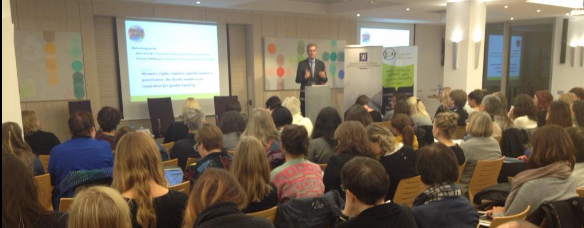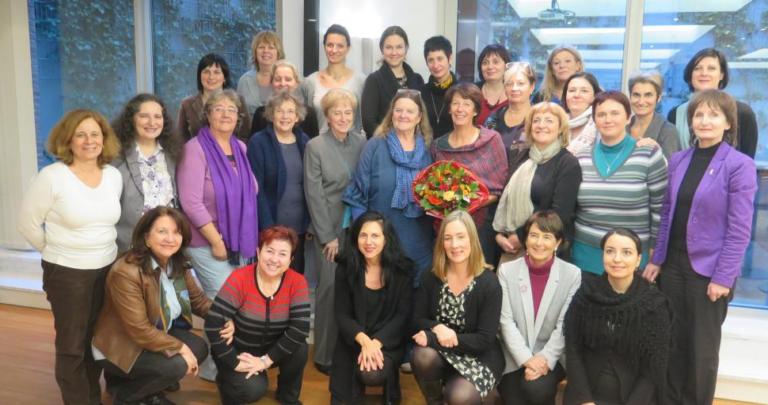[Brussels, 27 May 201] Saturday 28 May marks International Day of Action for Women’s Health, an occasion to remind decision-makers that women’s health is a fundamental human right and should be protected by all means. This year, however, developments in Hungary predicating a denial of women’s basic sexual and reproductive rights have cast a long shadow over the celebrations of European organisations working to protect women’s health and promote gender equality, including the European Women’s Lobby (EWL) and the International Planned Parenthood Federation European Network (IPPF EN).
The new Hungarian Constitution – scheduled to enter into force on 1 January 2012 – poses a grave threat to women’s sexual and reproductive rights, as it includes a sentence on the protection of the fetus from conception (‘Everyone has the right to life and human dignity, the life of the fetus is protected from conception’). This sentence opens up the possibility of a tightening of the procedure in Hungary regarding access to abortion and is also likely to call into question the legality of other fertility and contraception methods and services. Moreover, the Hungarian government has initiated a campaign against abortion, which will run for two months and show a picture of a fetus accompanied by the words: ‘I understand it if you aren’t ready for me, but rather put me up for adoption, let me live!’
For European women’s organisations, the blatant back-peddling on women’s basic rights and measures fundamental to equality between women and men comes as a shock: ‘After 53 years of existence and with commitments to the promotion of equality between women and men in the Treaties and the Charter of Fundamental Rights, the European Union should be a strong defender of women’s rights’, says Eva Fager, EWL Vice-President. ‘We very much hope that the EU will be carefully monitoring the member states and will take action to ensure respect for women’s human rights, including their sexual rights.’
All EU member states are also signatories to the Cairo Programme of Action, adopted at the 1994 International Conference on Population and Development, according to which reproductive rights rest on the recognition of the basic right of all couples and individuals to decide freely and responsibly the number, spacing and timing of their children, and to have the information and means to do so, including access to health care, legal and safe abortion, and reliable, safe and affordable contraception.
The Hungarian text is clearly at odds with this commitment: ‘We are particularly concerned with the fact that the new constitution will open the way for potential misinterpretations that undermine the right to abortion for all women’, comments Elizabeth Bennour, IPPF EN Director of Programme and Advocacy. ‘Over recent years, we have witnessed a hardening of opposition to the fundamental right of women to decide over what happens to their own body. The response to these attacks must come from all those who believe that women have an inalienable right to their own bodies, in a society that is equal, democratic and secular.’
Critics of the Hungarian initiatives point out that policies restricting access to abortion, sexuality education and contraception lead to concrete threats on women’s health, including maternal deaths and unwanted teenage pregnancies. In addition, they dispute the effectiveness of such measures for reducing abortion rates, noting that the lowest abortion rates in the world are in western and northern European countries, where abortion is accessible with few restrictions.
The EWL and IPPF EN are calling on the Hungarian government to ensure that the Constitution’s provisions will not affect the fundamental rights of all women to enjoy their sexual and reproductive rights and health. ‘On the occasion of the International Day of Action for Women’s Health, we hope many national and European voices will echo this call and ensure European and international commitments for the protection and promotion of women’s basic rights are fully respected,’ concludes Cécile Gréboval, EWL Secretary General.
For more information, interviews, background or visual materials, please contact Leanda Barrington-Leach, EWL Communications and Media Officer, T: (+32) 2 210 04 27, barrington@womenlobby.org, and see www.womenlobby.org.
Note to editors:
The European Women’s Lobby (EWL) is the largest umbrella organisation of women’s associations in the European Union (EU), working to promote women’s rights and equality between women and men. EWL membership extends to organisations in all 27 EU Member States and the three candidate countries, as well as to 21 European-wide organisations, representing a total of more than 2500 associations.
The International Planned Parenthood Federation European Network (IPPF EN) is one of six regions of the International Planned Parenthood Federation which is a global service provider and leading advocate of sexual and reproductive health and rights for all. IPPF EN includes 41 member associations in as many countries throughout Europe and Central Asia.
Download the Press Release in Word format:
ewl ippf en press release women s health and hu constitution 27 may 2011
Attached documents



